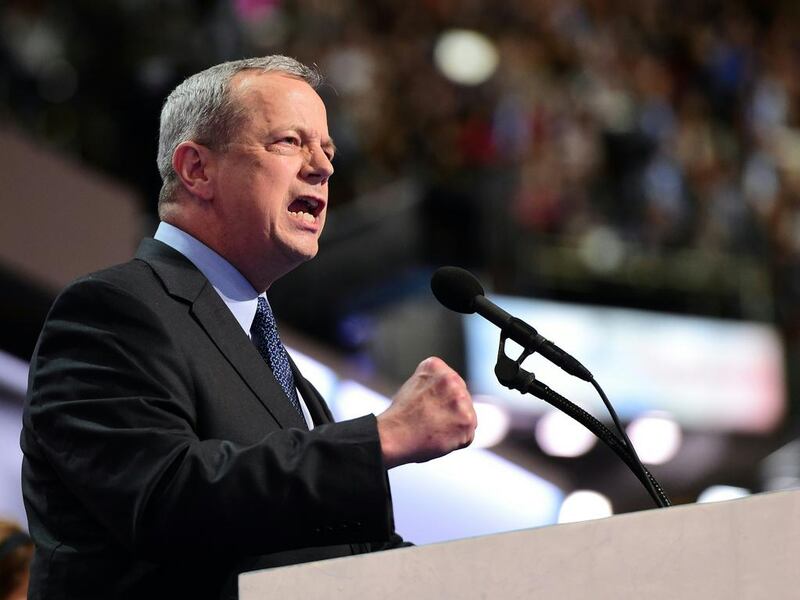NEW YORK // A new economic initiative for the Middle East - much like the Marshall Plan for Europe after the Second World War - is the only way to tackle the root causes of extremism and decisively defeat ISIL, said a former senior US general.
John Allen, who served as Barack Obama's first special envoy to the coalition fighting ISIL and who was considered as a contender for Hillary Clinton's running mate in next month's presidential election, said the military approach in the region was not working and risked locking the world into a never-ending conflict.
Although he said the current operation to take the Iraqi city of Mosul was likely to succeed, and that the group's de facto capital of Raqqa in Syria would eventually fall, he told the BBC that a broader approach - providing aid and other financial support for Middle East countries - was the only way to ultimately defeat ISIL and its successors.
The Marshall Plan was an American initiative that led to the recovery of Europe after the Second World War, and saw Washington invest US$12 billion (Dh44bn) to help rebuild western European economies.
"The trajectory we're on is not promising," said Gen Allen, who commanded the American-led coalition in Afghanistan before serving as Mr Obama's point man on ISIL for a year.
"We're going to have to think differently about how we're going to solve these issues, otherwise we are going to be condemned to interminable conflict and that should not be what we bequeath our children."
Gen Allen compared the present day Middle East conflict with the Cold War, which he said was ended by the impact of the Marshall Plan.
"The knockout blow came from something that wasn't military," he said.
"It was the Marshall Plan and we are hearing more and more leaders around the world recognising that to really deal with an organisation like ISIL and its related extremist mutations we have to deal with the underlying social, economic and political circumstances that have festered for so long and have created such animosity within local populations that the radicalisation is simply interminable.
"We have got to deal with that or we can never deal with extremist organisations except in a military manner and that's not a winning proposition."
He said the aim was to remove the conditions that made populations vulnerable to radicalisation, providing a generation-long push for government reform and job creation.
Gen Allen laid out his plan at the weekend as the Iraqi army continued its advance towards Mosul, pushing into the Christian town of Qaraqosh, also known as Hamdaniyah, where troops raised their flag above a government compound. However, clashes continue in the town, as well as in the northern city of Kirkuk, where ISIL launched an assault on Friday to divert attention away from the Mosul offensive.
The original Marshall Plan is frequently cited as America's most successful piece of twentieth century foreign policy.
But any new proposal would face a tough task winning the support of Congress, where Republicans are suspicious of multilateral partners such as the United Nations, and are seeking to cut aid spending.
There could be other problems too, warned Shashank Joshi, senior research fellow at the Royal United Services Institute in London.
"One is that a large injection of resources into a region with poor governance could have unforeseen consequences, from worsening corruption [as we saw in Afghanistan] to driving competition for the resources," he said.
"A second is that the Marshall Plan operated in a totally different political environment, with over half the money going to Britain, France, and Germany - all democratic governments with good governance, or in Germany's case an occupied and pliant regime."
Besides, matching the Marshall Plan would cost ten times more in today's money - $120 billion, more than three times the entire US aid budget.
Despite the drawbacks, Gen Allen is not the first to propose a Marshall Plan for the Middle East, in the belief that economic stability would lead to political security.
Earlier this year, Lindsey Graham, a senator who stood as a Republican candidate for president before dropping out last December, set out a plan to send billions of dollars in aid to states on the front line of the fight against ISIL. He picked out Egypt, Lebanon and Jordan as those most in need of help dealing with refugees and preventing the spread of ISIL's ideology.
"I'm a pretty hawkish fellow, but I learnt a long time ago ... that you are not going to win this war by killing terrorists," he said.
Bono, the rock star and philanthropist, also expressed his support for the plan in April.
"When aid is structured properly, with a focus on fighting poverty and improving governance, it could just be the best bulwark we have against the extremism of our age," he said.
foreign.desk@thenational.ae
Former US general calls for Marshall Plan for the Middle East
The original Marshall Plan was an American initiative that led to the recovery of Europe after the Second World War, and saw Washington invest US$12 billion (Dh44bn) to help rebuild western European economies.

More from the national




